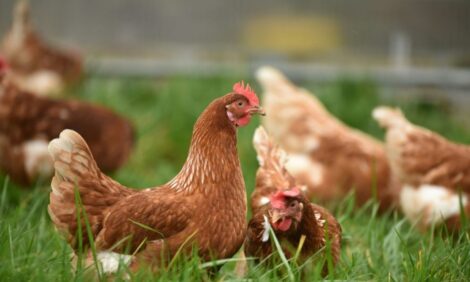



Weekly global protein digest - HPAI on the rise, US-Canadian dairy access, South American beef exports
Livestock analyst Jim Wyckoff shares protein news from around the worldUSDA reports significant increase in bird flu cases, affecting millions of birds
This month, approximately 5.78 million birds have been affected, a substantial rise from the 1.37 million reported last month. The states most heavily impacted by the recent outbreak in the last 30 days include Minnesota, Iowa, Ohio, and Oregon. In Iowa, infections this year are occurring at a rate three times higher than those detected in October, November, and December of the previous year, according to the Iowa Capital Dispatch. In terms of international trade, China's customs administration had imposed restrictions on poultry shipments from numerous American states during the previous outbreak. These restrictions remained in place even after the cases subsided. However, China recently lifted restrictions on poultry imports from specific states, including Kentucky, Oklahoma, Delaware, North Carolina, Maine, Maryland, and Texas, according to USDA’s report earlier this month. Nonetheless, bans on shipments from 31 other states are still in effect as of Nov. 15.
Weekly USDA export sales for US beef, pork
Beef: Net sales of 6,300 MT for 2023 were down 37 percent from the previous week and 49 percent from the prior 4-week average. Increases primarily for South Korea (3,600 MT, including decreases of 600 MT), Japan (2,400 MT, including decreases of 600 MT), Canada (900 MT, including decreases of 100 MT), China (600 MT, including decreases of 200 MT), and Mexico (600 MT), were offset by reductions for Hong Kong (2,500 MT). Net sales of 4,300 MT for 2024 were primarily for South Korea (2,000 MT), China (1,000 MT), Hong Kong (400 MT), Japan (300 MT), and Taiwan (300 MT). Exports of 12,800 MT were down 15 percent from the previous week and 11 percent from the prior 4-week average. The destinations were primarily to South Korea (4,000 MT), Japan (3,300 MT), China (1,500 MT), Mexico (1,200 MT), and Canada (800 MT).
Pork: Net sales of 21,200 MT for 2023 were down 20 percent from the previous week and 35 percent from the prior 4-week average. Increases primarily for Mexico (7,500 MT, including decreases of 1,100 MT), South Korea (3,400 MT, including decreases of 300 MT), Japan (3,000 MT, including decreases of 300 MT), Australia (1,600 MT), and Colombia (1,600 MT, including decreases of 300 MT), were offset by reductions for China (100 MT). Net sales of 5,600 MT for 2024 were primarily for Japan (2,800 MT), Canada (1,100 MT), Mexico (300 MT), the Dominican Republic (300 MT), and South Korea (300 MT). Exports of 27,800 MT were down 14 percent from the previous week and 13 percent from the prior 4-week average. The destinations were primarily to Mexico (9,800 MT), South Korea (4,500 MT), Japan (4,200 MT), China (2,100 MT), and Canada (1,900 MT).
USDA extends NSIS trial for pork industry by 90 days
USDA has announced the Time-Limited Trial for New Swine Inspection System (NSIS) plants will be extended for an additional 90 days, providing certainty for our pork industry and ensuring participating plants can continue operating at increased line speeds.
Details: In March 2021, a court order issued by the US District Court for the District of Minnesota vacated the component of USDA’s New Swine Slaughter Inspection System (NSIS) that eliminated line speed limits for participating establishments. As a result, all NSIS establishments were required to operate at line speeds not exceeding 1,106 head per hour as of June 30, 2021. In November 2021, USDA’s Food Safety and Inspection Service (FSIS), in consultation with the Occupational Safety and Health Administration, invited NSIS establishments to participate in a time-limited trial (TLT), during which the establishments have been allowed to operate at an increased line speed while collecting and submitting data that would be used to evaluate the impact of increased line speed on workers.
FSIS contracted with a third-party team of worker safety experts to evaluate the data submitted by the swine establishments. The team of experts determined that the data submitted was not sufficient to evaluate the impact of increased line speeds on worker safety in NSIS establishments. Accordingly, to obtain the data necessary to inform any future rulemaking, FSIS is commissioning a study that will independently generate the necessary data for expert analysis. FSIS as noted will extend the TLTs for up to an additional 90 days while the study is being designed by the team of experts.
FSIS will send letters to the six swine establishments with requirements they will need to continue to meet to operate a TLT during the 90-day period, including keeping in place measures outlined in their worker safety agreements. The agency will follow up with additional communication to the public once the details of the study, including its duration, are determined.
Congressional pressure. The announcement comes after Rep. Brad Finstad (R-Iowa) and Sen. Chuck Grassley (R-Iowa) led a bicameral group of 18 Members of Congress on November 2, 2023, in sending a letter to USDA Secretary Tom Vilsack, urging the agency to immediately issue an extension of the Time-Limited Trial for the six NSIS pork processing plants. House Ag Chair G.T. Thompson (R-Pa.), while welcoming the short-term extension, said he remained “concerned that the Biden administration’s actions on pork processing line speeds only removes the certainty that the nation’s producers, processors, and consumers deserve. As USDA moves toward a more permanent solution, it is my hope the department operates with transparency to ensure our pork processing facilities can maintain full operational capacity and protect our nation’s food supply."
The National Pork Producers Council (NPPC) applauded the announcement. “Amidst a historically dire pork market, we thank Secretary Vilsack for his actions to preserve harvest capacity, which provides market power to producers when selling hogs,” said NPPC President and Missouri pork producer Scott Hays. “Without the extension, pork producers would incur additional losses of nearly $10/head in Q1 and Q2 2024.”
Minerva CEO: South America will account for half of global beef exports in five years
South American will account for 50% of global beef exports in five years, up from 40% presently, according to beef packer Minerva’s Chief Executive Fernando Queiroz. Minerva, which bought plants from competitor Marfrig to boost its presence in South American countries this year, believes processing grass-fed cattle is a competitive advantage for firms that operate in the continent. South America also boasts lower labor costs compared to countries like the United States, Queiroz said. “We have the best global platform to mitigate risks,” Queiroz said, referring to the current low availability of cattle in the US that is affecting rival companies there.
France reports HPAI on turkey farm
France detected an outbreak of highly pathogenic avian influenza (HPAI) on a turkey farm in the northwest of the country, the ag ministry said, as a seasonal wave of infections spreads across Europe. France’s first farm case this fall occurred near where an infected wild bird was found, the ministry said. France launched a vaccination campaign against HPAI in early October, but the program is being initially limited to ducks, which are the most vulnerable to the virus.
China to buy more pork to support prices
China will buy another 10,000 MT tons of pork for state reserves on Wednesday, the country’s reserve management center said. This will be the third batch of pork purchases by the government to support falling hog prices.
Chinese hog futures plunge to record-low
China’s most active hog futures closed down 5.69% on Monday at a record low, after farmers ramped up selling of pigs following months of weak prices. Farmers accelerated herd liquidation in recent weeks, as cash hog prices dropped another 4% last week. January hog futures have plunged more than 9% so far this month.
China's swine fever epidemic leaves lasting global pork market impact
China, the world's top producer and consumer of pork, faced a significant outbreak of African swine fever among its pig herds that lasted for three years until late 2021. Despite its recovery, the domestic pork market in China remains volatile, posing potential uncertainties for pork exporters worldwide. The epidemic had lasting impacts on the global pork market, as outlined in a report by three USDA economists:
- Pork output impact: During the 30 months of the epidemic, China's pork production dropped by an average of 18% below normal levels.
- Consumer price surge: Pork prices for consumers doubled for 14 months, ending in January 2021, and only returned to pre-epidemic levels by September 2021.
- Limited imports: Although record amounts of pork were imported during the outbreak, they could only replace a fraction of the lost production.
- Hog farming consolidation: The epidemic led to the consolidation of hog farming into larger-scale operations.
- Higher production costs: China incurred higher production costs due to the construction of new, larger hog farms and stricter biosecurity practices.
- Sustained demand for imported pork: Rising pork prices in China, reflecting increased production costs, may continue to support the demand for imported pork, despite China's expansion of pork production capacity.
- Global pork market: China remained the world's largest pork importer in 2022, though its share of the global market was less than one-third of its peak during the epidemic.
Bottom line: The recovery and ongoing dynamics in China's pork industry have implications for both domestic and international markets, highlighting the complexities of the global pork trade.
White House has allocated millions of dollars to address methane emissions from California's dairy cows
Two grants from the Biden administration totaling $44.2 million have been awarded, with $21.4 million going to California Dairies and $22.8 million to the Dairy Farmers of America (DFA). These funds are intended for the development of feed additives aimed at reducing methane emissions produced by cow belches. Additionally, carbon credits are being offered to incentivize farmers to adopt climate-focused changes. California has set a target to reduce methane emissions in the dairy industry by 40% from 2013 levels by 2030. Dairy cooperatives in California have been collaborating with state and federal authorities on various projects to reduce emissions through manure and methane capture.
Federal jury finds egg producers guilty of price-fixing
In a long-standing legal case, a federal jury in Chicago has issued a verdict finding that several major egg producers engaged in a conspiracy to manipulate the US egg supply and increase prices during the period from 2004 to 2008.
US pork stocks fall more than average; beef stocks rise more than normal
USDA’s Cold Storage Report showed 444.3 million lbs. of US beef in frozen storage at the end of October, up 23.5 million lbs. (5.6%) from September. The five-year average was a 12.2-million-lb. increase in beef stocks during the month. Beef inventories dropped 65.9 million lbs. (12.9%) from last year and were 48.8 million lbs. (9.9%) under the five-year average. US pork stocks stood at 435.9 million lbs., down 25.7 million lbs. (5.6%) from September. The five-year average was a 15.7-million-lb. decrease during the month. Pork inventories fell 73.8 million lbs. (14.5%) from year-ago and were 80.5 million lbs. (15.6%) below the five-year average.
US complaint over Canadian dairy access rejected by USMCA panel
A trade dispute settlement panel established under the United States-Mexico-Canada Agreement (USMCA) has rejected a complaint filed by the United States against Canada. The complaint pertained to Canada's alleged improper limitation of access to its dairy market. Highlights:
- US Complaint: The United States had accused Canada of not fulfilling its obligations under the 2020 USMCA to open its dairy market to foreign producers. The US claimed that Canada was not providing adequate access to its market.
- Panel's Decision: A three-person independent panel was convened to address this dispute. The panel ruled that Canada had not acted unreasonably in its handling of dairy market access, effectively dismissing the US complaint. Their report was released on Friday (Nov. 24).
- US Response: US Trade Representative (USTR) Katherine Tai expressed disappointment with the ruling, emphasizing the US' continued concerns regarding Canada's implementation of dairy market access commitments under the agreement. She stated that the US would use all available tools to enforce trade agreements.
- Canada's Response: Canada's Trade Minister Mary Ng expressed satisfaction with the dispute settlement panel's findings, noting that all outcomes were in favor of Canada. She welcomed the decision.
- House Ag leaders’ statement: House Agriculture Committee Chairman G. T. Thompson (R-Pa.) and Ranking Member David Scott (D-Ga.) said: “We are disappointed in today’s announcement and the decision of the dispute panel. It is critical the US encourage and enforce USMCA, and this decision allows Canada to continue their questionable protectionist practices that disallow fair access to Canadian markets. We appreciate Ambassador Tai and the Biden Administration’s continued pursuit to ensure fair market access for US dairy producers.”
- Background: In a previous USMCA panel decision in January 2022, Canada was found to have violated the agreement by not opening its domestic market enough. Following that decision, Canada amended its policies. The USMCA retained Canada's supply management system, which limits domestic production of dairy, eggs, and poultry to support dairy farmers and protect them from import competition through high tariffs.
Bottom line: Before taking the role of USTR, Tai was a major writer of the USMCA enforcement action language. The most recent US trade policy loss again signals that the US trade lawyers were again found wanting.
Of note: The dairy sector is politically influential in Canada, with many farmers operating in Quebec and Ontario, provinces with a significant number of parliamentary seats.









